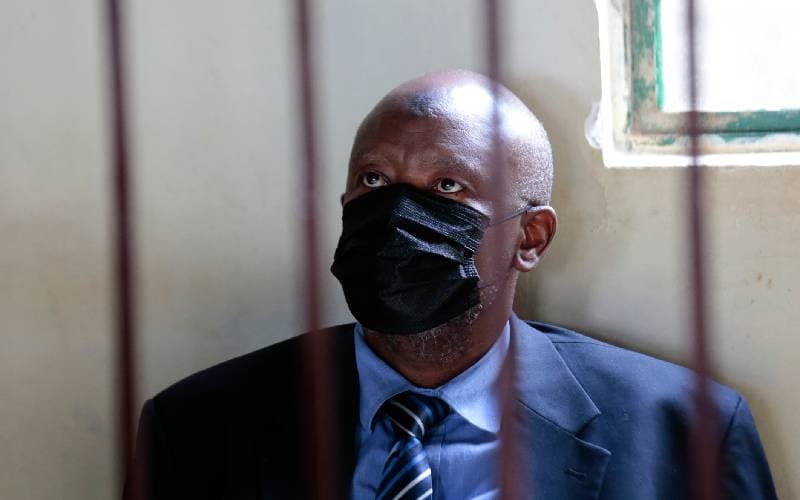We're loading the full news article for you. This includes the article content, images, author information, and related articles.
A Nairobi court is set to decide the fate of prominent human rights lawyer Chacha Mwita, whose case has become a flashpoint in the debate between national security and the professional duties of legal practitioners in Kenya.

NAIROBI – The Kahawa Law Courts is scheduled to rule today, Wednesday, 19 November 2025, on an application by Kenya's Anti-Terrorism Police Unit (ATPU) to detain prominent lawyer Andrew Chacha Mwita for 20 days. The veteran lawyer, known for representing suspects in high-profile terrorism cases for over a decade, now finds himself at the centre of a sweeping counter-terrorism investigation.
Mwita was arrested in Mombasa on Friday, 14 November 2025, as part of a nationwide operation that saw 22 individuals apprehended across Mombasa, Nairobi, Kapseret, Moyale, and Marsabit. He was subsequently transported to Nairobi and presented before Principal Magistrate Gideon Kiage at the Kahawa Law Courts on Monday, 17 November.
The prosecution, led by James Machirah, accuses Mwita of grave offenses, including facilitating terrorist acts, providing services to terrorist organizations, and financing terrorism. In an affidavit submitted to the court, ATPU's Inspector Kevin Kasango claimed that investigations have linked Mwita to a coastal recruitment network that radicalizes and funnels youth into terror groups. The state alleges that Mwita used multiple mobile phone numbers to receive cryptocurrency, specifically Bitcoin, via Binance accounts connected to an individual designated as a terrorist entity by the United Nations Security Council.
Prosecutors argued that the 20-day detention period is critical to allow investigators to conduct a thorough analysis of two phones and two laptops seized from Mwita upon his arrest. They further contended that his release could jeopardize ongoing local and international investigations, as several other suspects connected to the case are yet to be apprehended. The operation is reportedly focused on dismantling a complex syndicate that uses cryptocurrency and other digital channels to finance terror activities.
Mwita's defense team, which includes advocates Lempaa Soyinka, Ayota Magati, and Mbugua Mureithi, has vehemently opposed the detention request. They argue that the state's application lacks sufficient evidence and represents a thinly veiled attempt to intimidate and frustrate legal professionals who represent terrorism suspects. The defense asserted that providing legal services to any suspect, regardless of the charge, is a constitutionally protected duty and not a criminal act. "If they represent anyone associated with terrorism, the next day they will be where Mr. Chacha is," one defense lawyer argued in court, highlighting the potential chilling effect on the entire legal fraternity.
For over a decade, Mwita has been a fixture in Kenyan courtrooms, particularly those dealing with terrorism-related charges. He is also recognized for his human rights work, including providing pro-bono legal aid and advocating for the rights of inmates at Kamiti Maximum and Shimo la Tewa prisons. His arrest marks a dramatic role reversal, placing him on the opposite side of the legal battle he has waged for years on behalf of his clients.
Mwita's arrest comes amidst a broader crackdown on terror financing and recruitment networks in the region. The case also surfaces at a time of heightened debate over the use of Kenya's anti-terrorism laws, with some civil society groups arguing that the legislation is increasingly being used to suppress dissent. The Prevention of Terrorism Act (2012) grants authorities significant powers, including the ability to detain suspects for extended periods pending investigation.
If the court grants the ATPU's application, Mwita will be held at the Industrial Area Police Station in Nairobi while investigations proceed. The ruling by Magistrate Kiage is highly anticipated and will be closely watched by Kenya's legal community, human rights organizations, and national security agencies, as it could set a significant precedent for the intersection of legal practice and counter-terrorism efforts in the country.
Keep the conversation in one place—threads here stay linked to the story and in the forums.
Sign in to start a discussion
Start a conversation about this story and keep it linked here.
Other hot threads
E-sports and Gaming Community in Kenya
Active 9 months ago
The Role of Technology in Modern Agriculture (AgriTech)
Active 9 months ago
Popular Recreational Activities Across Counties
Active 9 months ago
Investing in Youth Sports Development Programs
Active 9 months ago